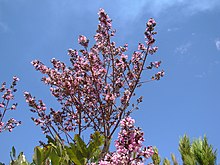Vataireoids
| Vataireoids | |
|---|---|

| |
| Vatairea macrocarpa | |
| Scientific classification | |
| Kingdom: | |
| (unranked): | |
| (unranked): | |
| (unranked): | |
| Order: | |
| Family: | |
| Subfamily: | |
| (unranked): | |
| (unranked): | Vataireoids |
| Genera | |
| |
| Synonyms | |
| |
The vataireoids are an early-branching monophyletic clade of the flowering plant subfamily Faboideae (or Papilionaceae) that are mostly found in northern South America, primarily Brazil.[3][4]
Description
This clade is composed of four genera, two of which were traditionally assigned to the tribe Dalbergieae (Vatairea and Vataireopsis) and two of which were traditionally assigned to the tribe Sophoreae (Luetzelburgia and Sweetia), mainly on the basis of flower morphology. [5][6] However, recent molecular phylogenetic analyses circumscribed these four genera into a strongly supported monophyletic clade.[3][4][7] The name of this clade is informal and is not assumed to have any particular taxonomic rank like the names authorized by the ICBN or the ICPN.[2] The clade is defined as:
"The most inclusive crown clade containing Sweetia fruticosa Spreng. 1825 and Vatairea guianensis Aubl. but not Andira inermis (W. Wright) DC., Zollernia ilicifolia (Brongn.) Vogel 1837, or Aldina insignis (Benth.) Endl. 1843."[2]
References
- ^ Pennington RT, Lavin M, Ireland H, Klitgaard B, Preston J, Hu JM (2001). "Phylogenetic relationships of basal papilionoid legumes based upon sequences of the chloroplast trnL intron". Syst Bot. 26 (3): 537–556. doi:10.1043/0363-6445-26.3.537.
- ^ a b c Wojciechowski MF. (2013). "Towards a new classification of Leguminosae: Naming clades using non-Linnaean phylogenetic nomenclature". S Afr J Bot. 89: 85–93. doi:10.1016/j.sajb.2013.06.017.
- ^ a b Cardoso D, Paganucci de Queiroz L, Cavalcante de Lima H, Suganuma E, van den Berg C, Lavin M (2013). "A molecular phylogeny of the vataireoid legumes underscores floral evolvability that is general to many early-branching papilionoid lineages". Am J Bot. 100 (2): 403–21. doi:10.3732/ajb.1200276. PMID 23378491.
- ^ a b Cardoso DBOS. (2012). "Capítulo 5: A molecular phylogeny of the Vataireoid legumes underscores floral evolvability that is general to many early-branching papilionoid lineages". Sistemática de Papilionoideae (Leguminosae): filogenia das linhagens basais e revisão de Luetzelburgia (PDF) (Ph.D.). SiCAPES. Docket 28002016002P8.
- ^ Polhill RM. (1981). "Dalbergieae". In Polhill RM, Raven PH (eds.). Advances in Legume Systematics, Part 1. Royal Botanic Gardens, Kew. pp. 233–242. ISBN 9780855212247.
{{cite book}}: Cite has empty unknown parameter:|chapterurl=(help) - ^ Polhill RM. (1981). "Sophoreae". In Polhill RM, Raven PH (eds.). Advances in Legume Systematics, Part 1. Royal Botanic Gardens, Kew. pp. 213–230. ISBN 9780855212247.
{{cite book}}: Cite has empty unknown parameter:|chapterurl=(help) - ^ Cardoso D, Pennington RT, de Queiroz LP, Boatwright JS, Van Wyk BE, Wojciechowski MF, Lavin M (2013). "Reconstructing the deep-branching relationships of the papilionoid legumes". S Afr J Bot. 89: 58–75. doi:10.1016/j.sajb.2013.05.001.
